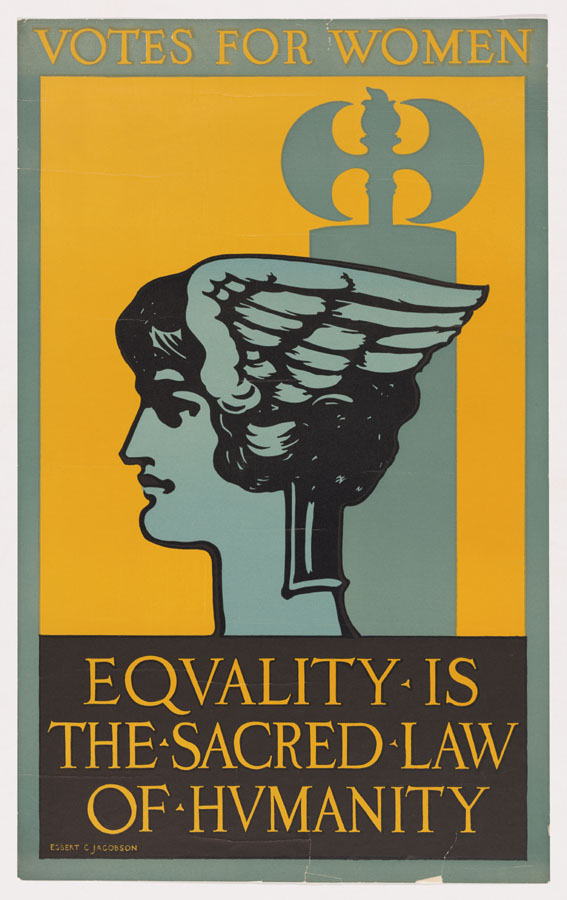 This post is from a news release courtesy of the Society of American Archivists’s Committee on Public Awareness. Be sure to visit the poster exhibit on The Ames Library’s entry level, too!
This post is from a news release courtesy of the Society of American Archivists’s Committee on Public Awareness. Be sure to visit the poster exhibit on The Ames Library’s entry level, too!
Archives contain primary sources such as letters, photographs, and audio and video footage that document the work of early suffragists such as Carrie Chapman Catt, Elizabeth Cady Stanton, Minnie Fisher Cunningham, Angelina Weld Grimke, and Ida B. Wells-Barnett. In making these materials available, archivists hope to remind the public of the long history of the battle for the right to vote and the suffragists’ roles in the fight for equality.
Here are a few archives and history organizations that are remembering the suffrage centennial via online exhibits, social media, and lesson plans. You are invited to join in the celebration!
- The National Archives Museum in Washington, DC, created Rightfully Hers: American Women and the Vote, a 3,000-square-foot exhibit that draws from more than 90 documents, photographs, and artifacts in its collection – including the original Nineteenth Amendment, which will be on limited display. Check out the virtual exhibit led by archivist and curator Corinne Potter. The National Archives also has created a nationwide traveling exhibit, pop-up displays for classroom use, and educational resources and lesson plans for educators to incorporate into their curriculum.
- The Women’s Suffrage Centennial Commission was established by Congress in April 2017 “to commemorate and coordinate the nationwide celebration of the 100th Anniversary of the 19th Amendment.” The non-partisan commission has created a federal legislative tracker to note all suffrage-related congressional legislation, as well as a chronological list of press releases on suffrage news, programs, and events.
- The National Organization of Women is highlighting past and present “sheroes” via its Sisters in Suffrage website and social media campaign. Each day in the 100 days leading up to the anniversary of the vote, NOW has released a new image and biographical sketch that illustrate the extraordinary work of these remarkable and diverse women. The public is encouraged to participate and follow along via social media with the hashtags #sistersinsuffrage, #Celebrating100, #righttovote.
- The Jimmy Carter Presidential Library and Museum is celebrating the centennial via a Google Arts and Culture exhibit about Rosalynn Carter’s fight for the Equal Rights Amendment (ERA); an article for The Text Message, the blog of the National Archives and Records Administration, about President Carter meeting an original suffragist prior to the Alice Paul Memorial March of 1977; and a new interview of Rosalynn Carter by her former daughter-in-law, Judy Langford Carter, about the fight for ERA.
- The Radcliffe Institute’s Schlesinger Library at Harvard University has invited researchers, writers, and teachers to create a series of digital teaching modules for its Suffrage School. Each lesson connects to the library’s Long 19th Amendment Project, tackling the tangled history of gender and American citizenship, and includes a short video in which the instructor shares a primary source from the Schlesinger’s collections. Lessons include a link to the digitized documents, questions to guide further reflection, and additional readings.
- The National Women’s History Museum provides a wide variety of lesson plans, modules, downloadable documents, PowerPoints, and videos for educators wanting to integrate the history of Women’s Suffrage into their educational curriculums. Each specific lesson plan is tailored to meet the requirements of students from grades 6 to 12. Additionally, a timeline of the suffrage movement and corresponding educational activities test students’ knowledge of the timeline.
- The National Park Service, through its 20 Suffragists to Know for 2020 profiles, spotlights the biographies of diverse women of color, such as Marie Louise Bottineau Baldwin, Mabel Ping-Hua Lee, Nina Otero-Warren, and Zitkala-Ša, whose work contributed to the passage of the 19th Amendment even as they waged their own battles against racism and discrimination.

0 Comments.